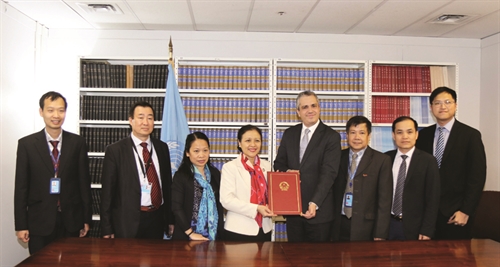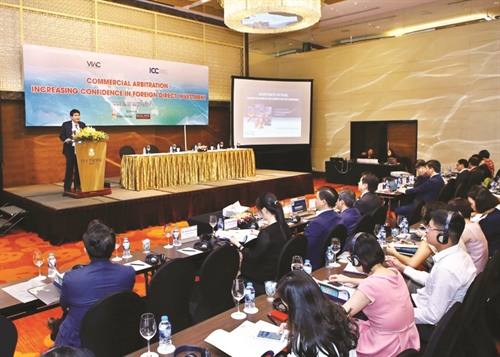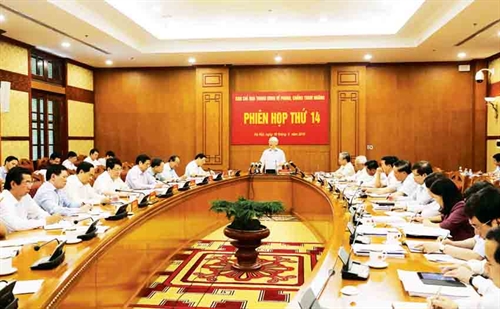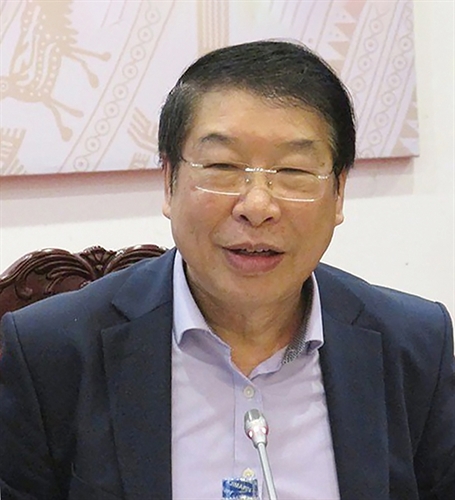 |
The National Assembly on June 10 discussed the draft law revising a number of articles of the Law on Organization of the Government and the Law on Organization of Local Administrations. Associate Professor Dr. Le Minh Thong, who is an assistant to National Assembly Chairwoman Nguyen Thi Kim Ngan, talks with the media on some issues of public concern relating to the reorganization of the government apparatus.
Some experts propose revising the Law on Organization of the Government towards giving more powers to the Prime Minister and ministers. What are your opinions?
First, I assert that any adjustment must comply with the Constitution, following the principle that the powers of the Government cannot be transferred to the Prime Minister. The reason is that under the Constitution, either the Government or the Prime Minister has its/his/her own powers and they are constitutional powers. Hence, the law must comply with the Constitution. Thus the assignment of any more powers to the Prime Minister should be carefully considered so as to ensure compliance with the Constitution.
Second, we should determine the powers of the Prime Minister by concretizing his/her constitutional powers rather than shifting powers from the Government to the Prime Minister because such a move is neither constitutional nor suitable.
Each ministry is a constituent of the government apparatus, hence, in principle, ministries should act as the advisory bodies of the Government functioning to recommend undertakings and policies to the Government for the latter to make decisions within its jurisdiction. Thus, we may further specify the powers of ministries to help them better perform their advisory function.
On the other hand, it is maybe the time to further concretize the competence of each ministry in the capacity as the entity responsible for a sector. For a long time, we have not yet clearly distinguished the role of a ministry in the capacity as a government-attached agency from its role as a line ministry. If possible, such a thin line should be identified in a more clear manner so that on the one hand ministries cannot overstep their authority but, on the other hand, have to enhance their accountability, thus contributing to solving the question of national governance in the fields under their management. Otherwise, everything will be either delayed pending decision of the Government, forwarded to the Government or decided by ministries at their own will. This is a dangerous situation.
There are opinions that ministries are passing the bucks to one another because of overlaps in their functions and tasks. What do you think about this?
Yet, the incumbent government structure should be kept unchanged but we should be more aware of the need to apply the multi-sectoral management model. In other words, we should take in mind the preparation of conditions for merger of ministries with similar tasks and functions, striving for the target that each ministry will take charge of multiple sectors and each issue will fall within the jurisdiction of only one ministry. The existing overlaps in functions and powers of ministries should be removed at any costs. If needed to revise any principles to obtain more grounds for restructuring the government apparatus of the next tenure, such revision must adhere to and demonstrate the multi-sectoral management model. Only in that way, may we streamline the apparatus.
Does it mean that some ministries will be merged with one another?
Absolutely, it is a must to cut down the number of ministries to comply with the multi-sectoral management model. To this end, we may assign interrelated functions to a single ministry. While developed countries have just 13-17 ministries each, Vietnam has a total of 22 ministries, a very high figure compared to the scale of our economy.
A bulky apparatus will lead to low effectiveness and shirking of responsibilities. As sectors are now intermingled with one another, we should link them together in order to streamline the apparatus while ensuring better coordination. If there is a focal point to take the lead, coordination among related parties will surely be smoother.
Of course, reduction of the number of ministries may lead to several problems that need to be solved.
First, some tasks of ministries should be transferred to social organizations and business community. In other words, ministries’ jobs will be cut down. To this end, it is necessary to improve the legal system so as to shift several functions which are now performed by the State to social organizations and business community so as reduce the workload of the State and Government.
Second, powers should be further decentralized to local administrations to prevent them from forwarding everything to the Government but be held responsible for the areas under their management. As the current law still fails to stipulate the decentralization of powers to local administrations, it is very difficult to force them to claim responsibilities for things happened in for their localities. In other words, the Government should only focus on institutional building, macro-management and national governance rather than resolving every specific case.
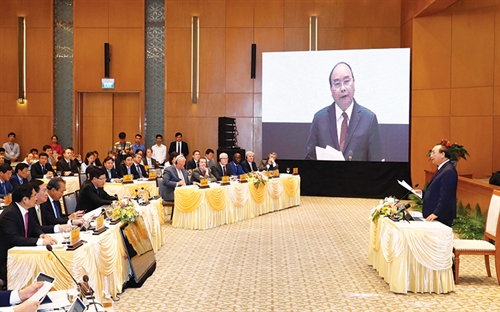 |
| Prime Minister Nguyen Xuan Phuc presides over a government meeting via e-cabinet platform__Photo: Thong Nhat/VNA |
The apparatus of ministries would become massive after the merger and surely many ministries will not want such change. What do you think about this?
This is not a matter of willing or not willing. As the Government represents the nation, it should follow a national approach for national interest but not ministerial or sectoral thinking. We should be strongly determined to re-organize the apparatus.
Merger does not mean mechanical combination, which in no way can help streamline the apparatus. This issue must be carefully studied, taking into account conditions for formation of multi-sectoral ministries. The apparatus of each ministry should be not only re-organized but also actually streamlined and simplified.
The draft revised Law on Organization of the Government introduces a new definition of government-attached agency. According to international practices, a government may contain few ministries and many government-attached agencies. These agencies are bodies that do not have the role of setting or building institutions but play a crucial role in enforcing and controlling the enforcement of law. They perform state management but do not have the power to make rules and just apply and control the application of rules.
Let’s take the competition regulator as an example. The competition management and anti-monopoly authority is the body in charge of enforcing decisions on competition and anti-monopoly. Hence, because competition guarantee and anti-monopoly work is related to all industries in the economy, the authority should be attached to the Government rather than the Ministry of Industry and Trade. Moreover, as competition cases are often related to different authorities under the Ministry of Industry and Trade, leading to a situation whereby the competition regulator could hardly handle its “siblings”.
We should re-shape government-attached agencies so as to build a system of bodies with simplified structure which are functioned to organize and control law enforcement activities and empowered to impose sanctions, revoke licenses and settle disputes. Such a way of organization will help create flexibility for government-attached agencies in the capacity as governing bodies. Then, ministries will focus only on institution building and policy making without having to put their hand on law enforcement work.-




